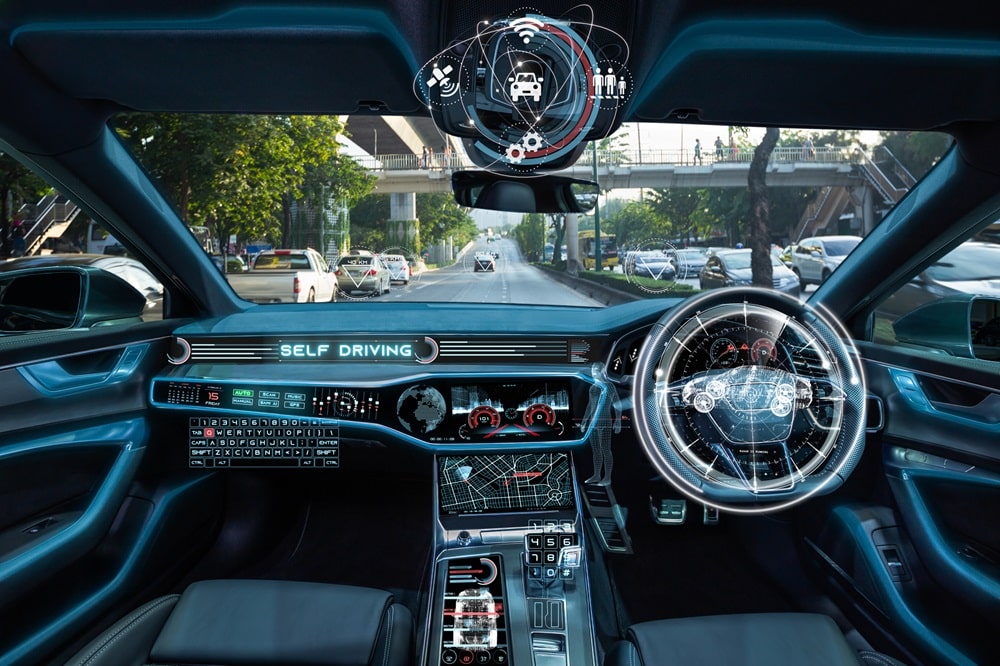Propelled by rapid advancements in technology and changing consumer demands, what we are witnessing in the current vehicle rental industry is a paradigm shift. Innovations in vehicle rental, particularly through the integration of autonomous and connected car technologies, are not just redefining the landscape; they are reshaping the very foundation of how consumers engage with mobility services. This transformative phase is indicative of a broader trend that sees traditional rental services evolving to meet the futuristic demands of efficiency, safety, and personalized experiences.
In this blog, we will look into the depths of how autonomous and connected car technologies are revolutionizing the car rental market. From self-driving car rental services enhancing the ease and safety of travel to connected vehicle technology providing unprecedented levels of interaction and personalization, the implications are vast and varied. As we explore the burgeoning era of Autonomous Vehicle Navigation Systems and their impact on the car rental business, we will uncover the potential these technologies hold for reshaping consumer expectations and experiences. So without wasting any time let’s get started!
The Rise of Autonomous Car Technology
The introduction of autonomous car technology marks a major transformation in the automotive and car rental sectors. This technology equips vehicles with advanced sensors and software, allowing them to operate independently, steering the car rental market into a new era. With a market size of USD 147.54 billion in 2022, the autonomous vehicle industry is expected to increase at a compound annual growth rate (CAGR) of 40.43% from 2023 to 2032. By 2032, the market is projected to grow to USD 4,372.74 billion.
Central to this are Autonomous Vehicle Navigation Systems, which combine GPS, radar, lidar, and computer vision to navigate and detect obstacles, significantly enhancing the safety, convenience, and efficiency of car rentals. This shift is altering consumer expectations, driving demand for integrated services that offer more than just transportation, but also comfort and safety.
Car rental businesses are responding by adopting autonomous vehicle fleets, aiming to cut costs and boost safety and customer satisfaction. This move is revolutionizing the car rental model, transitioning from traditional, manually-operated vehicles to those that are autonomous and connected, offering tailored user experiences.
Yet, the journey towards mainstream adoption of autonomous vehicles faces challenges like regulatory compliance, technological reliability, and building consumer trust. Despite these hurdles, the compelling advantages of autonomous technology—improved safety, lower costs, and better customer experiences—are spurring continued innovation in the sector.
Innovations in Vehicle Rental Services: Autonomous and Connected Cars
The integration of autonomous and connected car technologies is revolutionizing the car rental industry, ushering in a new era of innovation and service. This confluence is not merely a matter of adding new features to existing services but is fundamentally transforming the very essence of vehicle rental. By harnessing these technologies, the industry is moving towards a future where car rentals are smarter, safer, and more user-centric than ever before.
The fusion of autonomous car technology with connected vehicle systems has given rise to a novel concept in the car rental space: self-driving car rental services. These services promise an unprecedented level of convenience and efficiency, allowing customers to rent vehicles that can drive themselves. Imagine the possibilities—renters could summon a car to their location, enjoy a journey where they can work, relax, or socialize, and then send the vehicle on its way once they’ve reached their destination. This scenario, once deemed futuristic, is inching closer to reality.
Car Safety Features and Consumer Trust
As far as autonomous and connected vehicles are concerned, safety is not just a feature; it’s the cornerstone of consumer trust and acceptance. As car rental companies integrate more advanced technologies into their fleets, the emphasis on safety has never been more critical. The evolution of car safety features, particularly in the context of autonomous and connected car technologies, plays a pivotal role in shaping the future of the car rental industry.
Advanced Safety Technologies
Autonomous vehicles are equipped with a suite of safety technologies. These include advanced driver-assistance systems (ADAS) such as automatic braking, lane-keeping assistance, and pedestrian detection, which significantly reduce the likelihood of accidents. Connected cars enhance safety through features like real-time traffic updates, emergency response systems, and remote diagnostics.
Impact on Rental Industry
Integration of advanced safety features in rental fleets can significantly reduce accident rates and associated costs. Safety technologies not only protect renters but also safeguard rental companies’ assets and reputation.
Building Trust through Transparency
Rental companies need to be transparent about the safety features of their vehicles. Providing clear information and education on how to use these features can enhance consumer trust and comfort.
Regulatory Compliance and Standards
Adhering to strict safety standards and regulations is crucial for rental companies introducing autonomous and connected vehicles. Compliance demonstrates commitment to safety and can influence consumer trust positively.
Customer Education and Support
Offering tutorials, guides, and support for renters regarding the use and benefits of car safety features can lead to higher acceptance rates. Educating customers about the functionalities and advantages of autonomous and connected vehicles can demystify the technology and foster trust.
Feedback and Improvement
Gathering and acting on customer feedback regarding their experiences with safety features can help rental companies improve their offerings. Continuous improvement of safety technologies based on real-world usage is essential for maintaining and enhancing consumer trust.
Connected Vehicle Technology: A New Era in Car Rentals
The narrative of innovation in the car rental sector is incomplete without the mention of connected vehicle technology. This technological advancement refers to the integration of internet connectivity in vehicles, allowing them to communicate with external devices, networks, and services. This connectivity transforms traditional vehicles into interactive hubs, offering unprecedented levels of convenience and functionality to users.
Connected vehicle technology extends beyond mere internet access within the vehicle. It encompasses a broad range of features such as real-time traffic updates, remote diagnostics, on-demand entertainment, and enhanced navigation systems. For the car rental market, this technology not only improves the customer experience but also aids in vehicle management and maintenance, offering real-time insights into vehicle performance and user behavior.
The impact of connected vehicle technology on the car rental market is profound. It allows rental services to offer personalized experiences, adapting to the needs and preferences of each user. For instance, customers can pre-set their preferred vehicle settings through an app, which the car then automatically applies, ensuring comfort and convenience from the moment they begin their journey. Moreover, features such as keyless entry and remote vehicle management reduce the need for physical interaction, streamlining the rental process and enhancing user satisfaction.
The adoption of connected vehicle technology in rental services not only caters to the convenience of users but also represents a strategic move for businesses. By leveraging data collected from connected features, rental companies can gain valuable insights into user preferences, vehicle performance, and operational efficiency. This data-driven approach enables companies to optimize their services, predict maintenance needs, and tailor their offerings to meet the evolving demands of the market.
As connected vehicle technology continues to mature, its influence on the car rental market is expected to grow, driving innovations that cater to the increasingly digital and interconnected lives of consumers. It represents a key component in the shift towards more flexible, user-friendly, and efficient car rental services, aligning with broader trends in mobility and consumer behavior.
Challenges and Opportunities in the Adoption of Innovative Vehicle Rental Services
The transition towards autonomous and connected vehicle technologies in the rental industry presents a mix of challenges and opportunities. Understanding these can help stakeholders navigate the evolving landscape more effectively, ensuring a future where innovation leads to enhanced mobility and service excellence.
Challenges:
Regulatory Hurdles
The legal framework surrounding autonomous vehicles is still in development in many regions. Car rental companies must navigate varying regulations across different jurisdictions, which can be complex and time-consuming. Additionally, there’s the challenge of compliance with data protection laws due to the increased collection and processing of personal information through connected vehicle technologies.
Technological Reliability
Ensuring the reliability and security of autonomous and connected systems is crucial. Any technological failure can lead to safety risks, reduced consumer trust, and potential financial losses. Continuous updates, cybersecurity measures, and robust testing are essential to mitigate these risks.
Consumer Acceptance
Despite the advancements, some customers may be hesitant to adopt autonomous or connected vehicle services due to safety concerns, lack of familiarity, or privacy issues. Building trust and educating consumers about the benefits and safety features of these new technologies is critical.
Infrastructure Requirements
The successful deployment of autonomous and connected vehicles often requires supporting infrastructure, such as advanced charging stations for electric vehicles, connectivity networks, and navigation systems. Establishing this infrastructure can be costly and time-consuming.
Opportunities
Market Differentiation
By adopting autonomous and connected vehicle technologies, car rental companies can differentiate themselves in a competitive market. Offering innovative, safe, and efficient rental options can attract tech-savvy consumers and those looking for premium rental experiences.
Operational Efficiency
These technologies can significantly improve operational efficiency. Autonomous vehicles can reduce the need for manual vehicle movement and maintenance, while connected features allow for better fleet management and predictive maintenance, reducing downtime and costs.
Enhanced Customer Experience
The integration of advanced technologies allows for personalized and convenient customer experiences. From vehicle settings tailored to individual preferences to seamless rental processes and improved safety features, these innovations can significantly enhance user satisfaction.
New Business Models
The rise of autonomous and connected vehicles opens the door to new business models for the car rental industry. This could include subscription-based services, peer-to-peer car sharing, and other innovative rental formats that cater to changing consumer behaviors and preferences.
Conclusion
As we have explored, the innovations in vehicle rental, particularly through the integration of autonomous and connected car technologies, are not just reshaping the industry; they are redefining the very concept of vehicle rental itself. The journey from traditional, manually-operated rentals to autonomous, technology-driven services is underway, marking a significant evolution in how consumers approach mobility.
The adoption of autonomous car technology and connected vehicle systems is transforming the car rental business from a simple service into a comprehensive, user-centric experience. These advancements promise not only enhanced safety and efficiency but also a new level of convenience and personalization for users. As the industry continues to innovate, the traditional barriers between vehicle ownership and rental are blurring, giving rise to a new era of mobility.
To learn how technology is revolutionizing car rental experiences, read this.
About RENTALL
RENTALL is the broadest, most adaptable, and continuously evolving rental platform. No matter your company size, location, or business goals, RENTALL delivers improved operations, smart reports, increased bookings, and happy customers, all through an easy-to-use interface. Explore our solutions here, or connect with us at +1 888 628 6827 or info@rentallsoftware.com for a consultation.






























